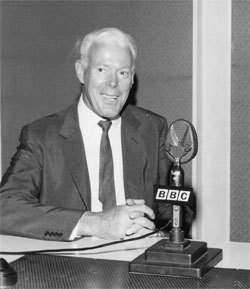Artists 24 November 1986
Trevor Leggett was head of the Japanese Department of the BBC.

This is one of his broadcasts to Japan
Zubari for 24 November 1986
Hello listeners! Today I am going to talk about writers, painters, musicians, and artists in general.
Artists, including musicians, have always had a special position in society. They themselves have often spoken of being inspired by something divine: the English word ‘genius’ means literally a spirit which guides and creates. In Japanese, the word would be usually translated I suppose, by ‘Tensai’: this too has the association with Heaven, something beyond this ordinary world of men.
On the other hand, the artist needs money in order to live. His genius gives him only inspiration; it does not supply food and clothes and a house. So, in such matters of everyday life, the genius is a sort of businessman or woman, who has to get a living somehow.
Many writers and other artists have felt this compulsion to earn a living by their art as a terrible burden. They sometimes despise the world, and often do not conceal their contempt. ‘What will sell’ may not be the same as ‘what is good art’. The artist must to some extent produce what will sell, even if he thinks it is bad art.
There are many stories, especially in Europe, about the cynical attitude of the artist towards his public.
For instance, here is one about Picasso, whose work was often imitated by forgers, some of them very skilful. One such forger had a quarrel with his mistress, who in revenge told the police that his studio was full of forgeries of Picasso. The French police made a raid, and discovered indeed a good number of canvasses which were imitations of Picasso’s work. One or two had been signed by the forger with Picasso’s usual signature, but most of them he had not yet signed. The police prosecuted the forger successfully on the evidence of the signed forgeries, and all the pictures were confiscated.
The authorities then asked Picasso what should be done with them. Did he want them to be simply destroyed?
‘Oh no,’ he replied, ‘I will take them.’ So, they were handed over to him.
Later, a friend asked: ‘Why did you ask for them?’
Picasso said cynically: ‘Well, I looked at all of them. Three or four were really good. So, I signed them myself and sold them.’
That is the story about him. Whether it is quite true, who knows?
There is a slightly similar story about Jack London, the American writer who was, at one time, the highest-paid short-story writer in America. He remarked once that when he had just written a story, he could not judge whether it was good or not. So, after writing each story, he would put it away in a drawer for a month. Then he would look at it again, and (he said) he could at once tell whether it was good or bad.
He concluded cynically: “If it is a good one, I sign it and send it to the publisher; and if it is a bad one, I sign it and send it to the publisher just the same. The public cannot tell the difference!”
Fifty years ago, there was a great musical scandal. Fritz Kreisler, then the top violinist of the time, had found some minor pieces by famous 18th Century composers, such as Vivaldi and Couperin. The manuscripts had been lying neglected in music libraries in various towns in Europe. He copied them out and then made arrangements of them for violin and piano. They were much admired, and often played, by himself and other famous violinists.
But a top-ranking English music historian and critic, Ernest Newman, made some researches, and discovered that the original manuscripts had never in fact existed. Kreisler then admitted that he had composed the pieces himself. After that, they were never played. Kreisler remarked cynically: “The music is the same, but if people think it is by Vivaldi, they find it marvellous; if they think it is by me, they think it is nothing. Oh, the public!”
Well, listeners, what do you think? Is your appreciation of a piece of music, or a story, influenced by who wrote it?
© Trevor Leggett